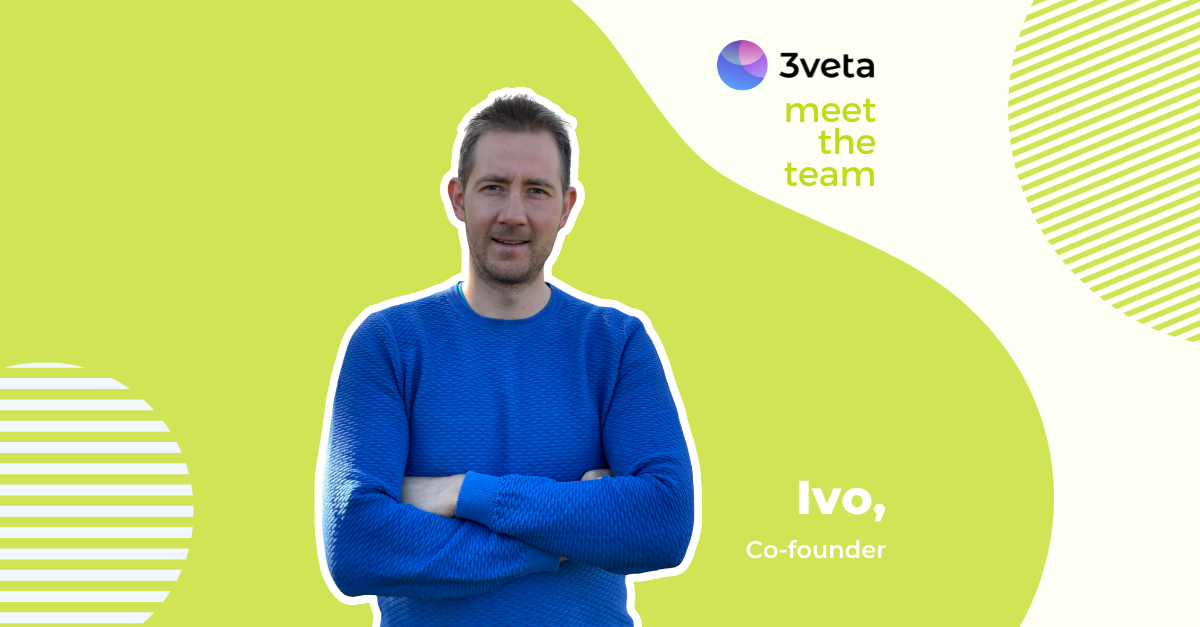Ivan Vaptsarov (Ivo) is the most senior person in 3veta’s team. He has worked with the government, big corporations, startups, consulting, small ventures, own projects, and side hustles.
His experience is extremely diverse but gravitates towards the most transferable of skills – project management.
Hello, Ivo. Nice to e-meet you. I am super excited about this interview because I know how diverse your background is! How about you tell us more about that?
First of all, hello to you and the rest of the colleagues in the marketing department 😊
So, about me. I grew up in Sofia, Bulgaria. In my teenage years, I was developing a basketball career in parallel to my studies. I was playing for one of the strongest junior teams in the country and even participated in a Men’s division for 2 years. I suppose I was into doing a few things in parallel even then, as my school was also quite demanding.
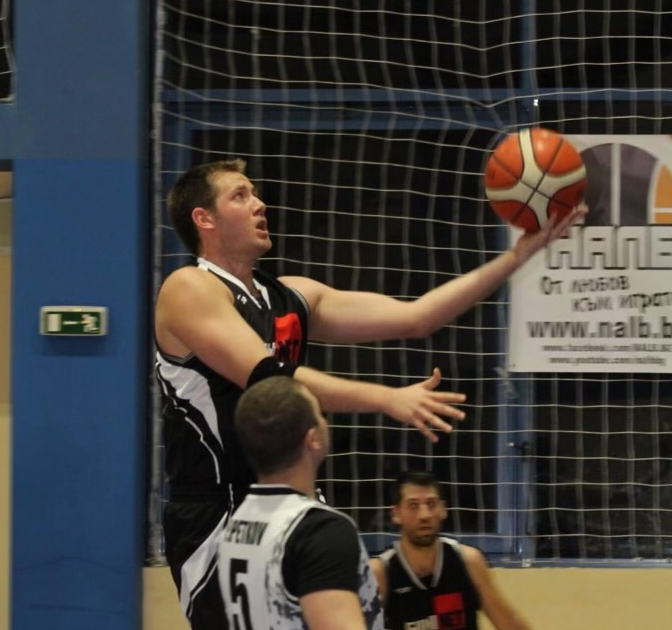
Anyway, my plan for the future was leaning on education, hence I pursued the opportunity to study abroad. 5 years later I had collected my Bachelor’s and Master’s degrees from Bocconi University, which is a notable trend among the 3veta co-founders 😊
Then my work-life started at full speed with a role in a management consulting company, followed by a project management role in a big American corporation. This period helped me build practical business expertise, which I always tried to link to the knowledge built at the university.
Later I got really passionate about the project management field and besides the hands-on experience, I got certified as PMP® (‘Project Management Professional’ by PMI), which is the world’s most renowned qualification for project managers.
So I am currently working as a project manager for a global manufacturing company, of course besides being a partner of the exciting 3veta team!
So you do have a full-time job apart from being a co-founder of 3veta. Are there any other exciting projects we should know about?
Well actually yes.
As I mentioned at the start, seems I always end up doing a few important things in parallel. I have already one startup behind my back – Devote Academy. The small team there is focused on delivering project management-related services, such as delivering training and consulting services. We are now working on a very interesting case, consulting a company in the life sciences sector and helping it develop a tailor-made project management methodology, along with all related practices, processes, and tools. But I will be able to tell you more next time.
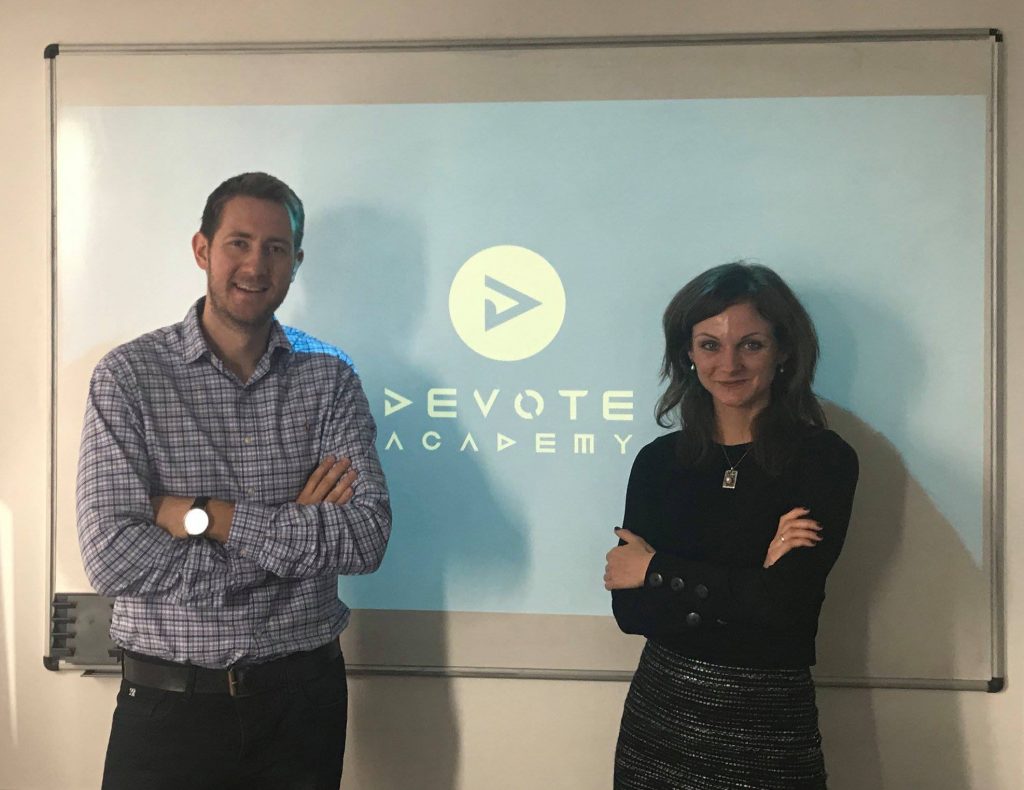
Last, but definitely not least, I have authored an online course for junior project managers in partnership with my friends at 365 Careers. Our course, The Project Management Course: Beginner to PROject Manager, is currently a Bestseller on Udemy with more than 70,000 subscribed students from all over the world. So yes, seems most of my endeavors gravitate around the project management field 😊
So your full-time projects are of enormous scale. Your other projects are small enterprises and startups. From a project manager’s point of view, what’s the main difference between these two types of projects?
Indeed, they are different.
Looking at them in general, big corporate projects usually consume significant company resources – financial, employee, management attention, and others. From a PM perspective, this requires solid structure, planning, and coordination of stakeholders. With some exceptions, being able to structure the project with predefined parameters and a detailed project management plan increases your chances to be successful.
Projects that are smaller in size, such as most of the startup-related ones have a different flavor.
Your team is usually in a more “experimental” environment where you need to test your concept and understand what would be the best way to shape your business. Such initiatives require mainly flexibility.
How can you be sure that you are nailing it from the beginning? Instead of losing precious time in trying to predict, you better structure the work in a flexible manner so you can adapt dynamically while observing and living the reaction of your target customers.
Furthermore, usually, you have even more limited resources at hand, so you need to be sure you use them in a way, which will bring tangible results.
In ‘PM words’, this would mean more structure and predictability for big projects and more flexibility and pragmatism for smaller endeavors. Pretty much waterfall vs agile methodologies.
After COVID many people started working from home. Tell us a bit more about how your commute has changed.
In my case, the commute disappeared. For almost 2 years my company moved to fully remote working. As my office is right across the street (lucky, huh?) if I have to go to the office, the commute itself practically did not change.
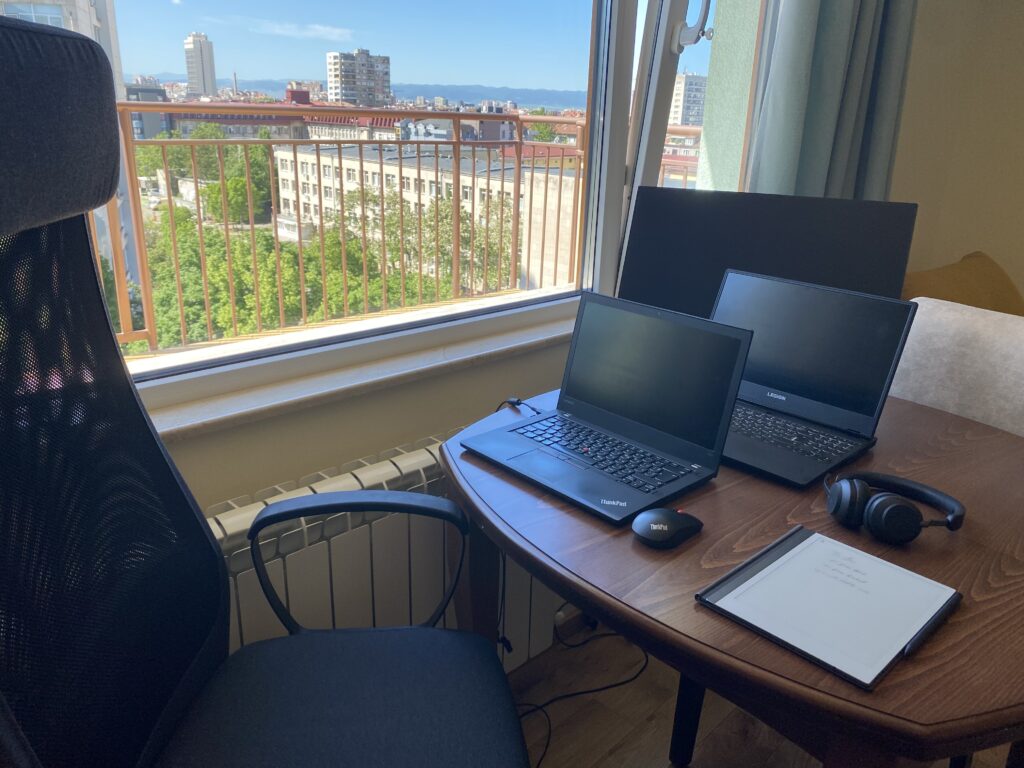
I know where you work, so I’d say your commute has decreased from 3 minutes (across the street) to 1 minute (across the room). Still, now that companies are going back to the office, would you say you engage in remote work or hybrid work? Tell us a bit more about how you manage this.
That is correct. Right now, I am engaging in a hybrid work model. It is still more than 50% from home, but visiting the office and being on business trips are coming back into the picture.
There are a lot of benefits in the hybrid model because you can enjoy the benefits of both worlds – having the flexibility to work remotely and organize your day accordingly, but also not losing the office touch.
For example, I led a big program for more than a year, working remotely with a few key people for the whole period. I finally met them in person recently, while on a business trip. It was a great feeling from a personal and work perspective. We can now go back to a remote state again but now we would know we have already met each other and worked very well in a “live” environment too.
I think this brought us closer together. And while remote and hybrid are generally better for me and my family, I love the fact that I met my colleagues in person.
As a project manager, does it really matter where and when you work?
In today’s circumstances, WHERE is not so important. If I quickly go back to the example I made in the previous question, although it was great meeting the team in person, it went just as per my expectations. The virtual version of the people with whom I have collaborated for more than a year turned out to match the real person – maybe to a 99.9% extent 😊 This means, remote work is absolutely sufficient for work.
The WHEN is definitely much more important… at least for my job. Regardless of the ‘where’, in each project, there are a few critical moments, in which the PM needs to be 200% dedicated. One must not lose the grip during those periods and it is all about timing.
How do you envision work as a whole 10 years from now? Will it be remote, hybrid, or back to the office? Do you think it will differ by industry or by company?
Remote working has proven itself as a big contestant for the new steady state.
Hopefully, the pandemic will soon be a bad memory, but the remote work will continue for many. I guess that in the next 5-10 years the jobs that are somewhat computer and communication based will convert to a hybrid model.
The benefits of this are just too significant.
Employees gain flexibility and more time for them. Companies have an opportunity to reduce costs and, even more importantly, have happier employees.
Hybrid is just too good.
On the 3veta About Us page, it reads: “Ivo has a framework in his pocket for all occasions in life”. What is this supposed to mean?
Hahaha… well, seems I am quite curious about business and management frameworks.
I guess this started during my years at the university. When I say framework, I intend pre-defined logic and structure that helps you manage a given business situation and drive correct business decisions. Some of the famous examples would be:
- Lean six sigma – if we want to improve the operations and processes in a company.
- Critical path method – if we want to efficiently sequence-related tasks in an initiative or a project.
- MOSCOW – if we want to be more structured when trying to prioritize development work.
- Porter’s 5 forces – if we want to understand the competitive environment for your business industry.
- Kanban, Theory of constraints, Pros and Cons analysis, Scenario analysis, SWOT analysis, the list goes on.
What I have been doing, maybe subconsciously, is collecting those into a Framework Swiss Knife, which I can use in many situations.
What is one framework you believe every reader should know about and implement in their life?
I think the top one for me is the 80/20 Rule.
I have found this one coming back to me so many times and from all kinds of contexts – personal life, corporate life, entrepreneurship, sports.
The simple idea of understanding on which 20% to focus your efforts, to gain 80% of the benefits. The Pareto principle.
It sounds very obvious, yet I keep seeing situations where people focus on doing and redoing work until it gets to the 100%. Of course, there are cases when we need to strive for 100%, but in many cases, this is very costly in terms of time and effort.
So… remember the 80/20 and strive for efficiency and productivity, instead of perfection.
In your opinion, what were the most defining moments in 3veta as a project?
3veta team is quite forward-looking and that can be seen also through the product. The mix of features is aiming to bring something new to the remote and hybrid working people. In that sense, all campaigns are quite interesting as we are testing new offerings to the market.
Nevertheless, I can probably highlight two moments.
First is the Big Bang, during which 3veta was shaped as a start-up. The founding team was gathered for 2 full weeks in the same place, where the full focus of everyone was put on the goal of building the strategy. This “Bootcamp” was the actual Kick-off of 3veta, during which we defined the business plan – product, offering, targeting, strategy, etc. Turning a concept into a concrete business model with specific actions on how to get there. It was.. well… fundamental 😊
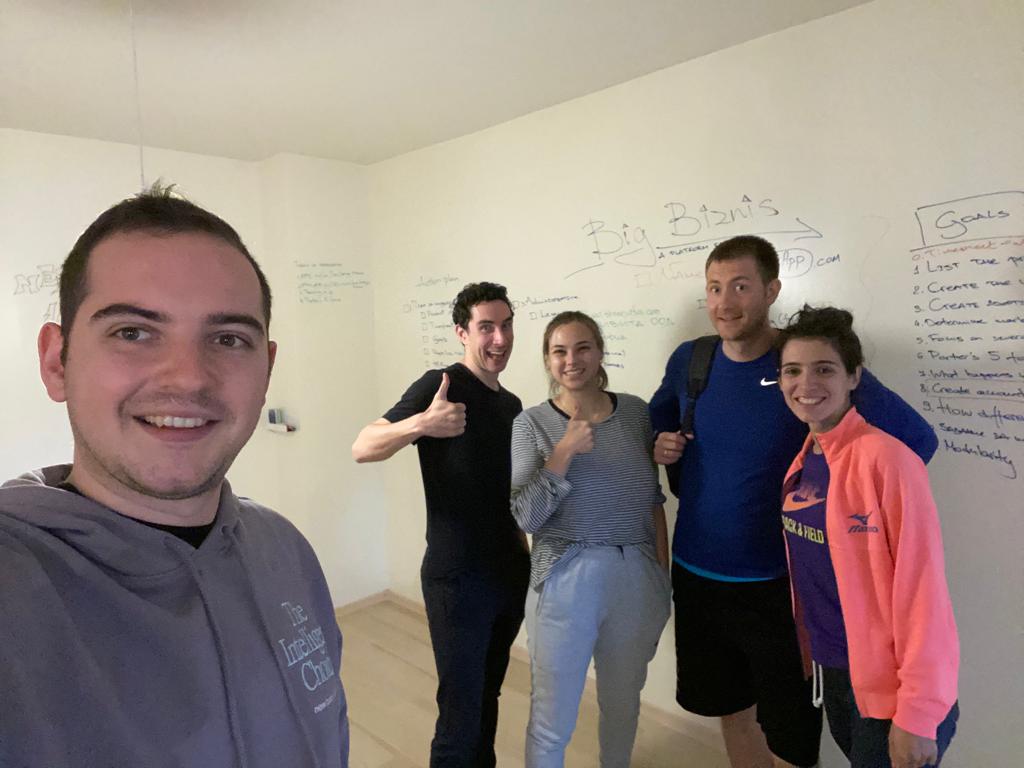
Funny story – one of the co-founders flew in from the UK and since it was lockdown times he was literally not able to move more than 100 m. away from our improvised office. Max efficiency!
The second really interesting campaign was around the mild shift in strategy that 3veta took in Q4 2021, by expanding the focus toward “teams”. With the precious market feedback we had collected with the first 1000 users we figured out that many remote teams of a certain size struggle with managing their calendars.
Furthermore, if the teams are formed from a mix of small companies, freelancers, etc., very often they use different calendars. This creates an inefficiency in such an important element – calendar management. This is the area that 3veta is now satisfying – no matter what calendars your team members, and internal and external partners use, 3veta can help your team be as efficient as possible, also when working remotely.
Is there something interesting about the future of 3veta you want to tell us about?
3veta is heading towards exploring all technology needs of the hybrid-working individuals and teams.
The most interesting new superpower of 3veta that is coming soon is the integration with Slack – one of the best communication tools there are for remote teams, startups, and SMBs. Shortly, 3veta will be one click away in your Slack.
As we are aimed at making a difference in the Hybrid work landscape, there will be many more to come. Stay tuned!
If you could improve one thing about the 3veta platform, what would it be?
The platform is on a continuous development path so it will be getting better and better. I think the biggest potential right now sits with the calendar-related functionalities. That’s also where the differentiation between 3veta and all other calendars or booking tools is being created. As we speak.
You are a project manager, so of course, your favorite features will be calendar-related! One final question. We understood you work a lot. How do you let the steam off?
I love sports.
Since my wife (our co-founder Katya) and I became the happiest people on earth with our girl stepping into our lives my sports focus changed and transitioned from gym and basketball to tennis and… training at home!
Let’s see what is the future of hybrid work-outs 😀
Thanks so much for this interview, Ivo. Good luck to you and the 3veta team!



